HOW TO BOOT TO UEFI SETTINGS USING A SHORTCUT IN WINDOWS 10
General
Most computers have a specific key which when pressed when computer is started lets user to access UEFI (Firmware) settings.
On laptop I'm using to write this, it's the ESC key. However, I quite often press the key too late missing the given time-frame,
as this laptop by default only waits only a few seconds before booting to Windows. I find it extremely frustrating and looked for an easier way.
Another option to boot to UEFI settings is to restart to Advanced Startup options and go from there.
This just wasn't making it any easier it for me, so I found something that takes away quite a bunch of my frustration.
This Tip will show a third not well known, but IMO, an extremely practical way to restart directly to UEFI settings using a shortcut.
NOTICE that the shortcut will NOT work on:
1.) BIOS based (Legacy) machines
2.) UEFI machines where entering firmware settings is DISABLED like in for instance on some rental computers
3.) Hyper-V virtual machines and so on.
How to Boot to UEFI Settings Using A Shortcut in Windows 10
1.) Right click on an empty spot on Desktop, select New > Shortcut:
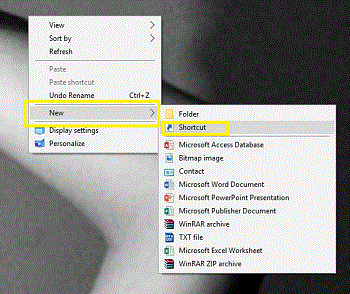
2.) Enter the following command and click Next:
shutdown /r /fw
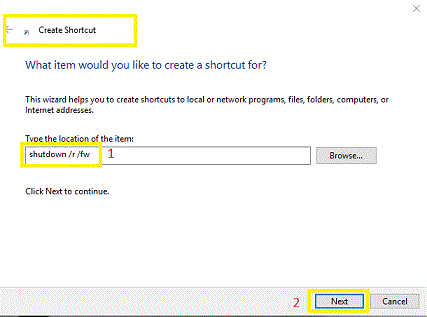
3.) Name the shortcut as you wish, click Finish:
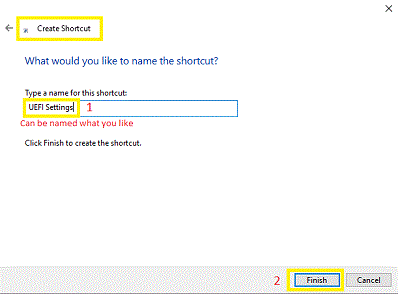
4.) Right click the new shortcut and select Properties:
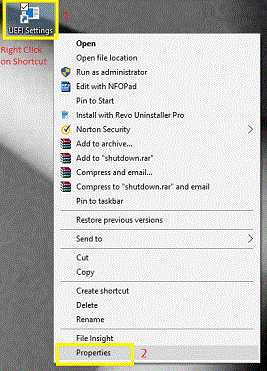
5.) In Shortcut tab, select Advanced, select Run as administrator, click OK to close Advanced Properties, click OK to save changed Properties:
NOTE:
Usually the shutdown command does not require elevated (Run as Administrator) privileges.
However, using the /fw switch (fw = firmware) to boot to UEFI settings is an exception;
whenever /fw is used with shutdown command, it needs to be elevated. That is why we must elevate the shortcut.
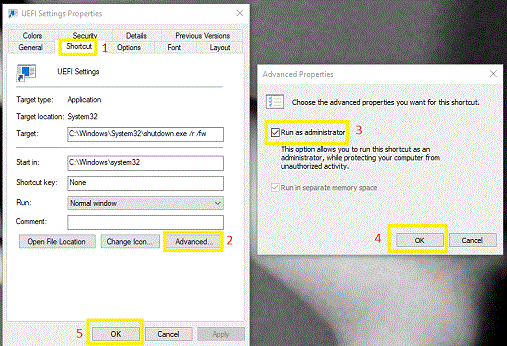
6.) You can now restart your PC entering UEFI settings simply by double clicking the shortcut. As it is elevated, a UAC prompt will be shown. Click Yes:
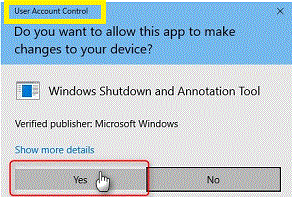
7.) You will get a notification about Windows signing you out. Click Close, close all possibly open applications and let your PC restart to UEFI settings:

8.) Your PC will now restart directly to UEFI settings
(below a sample screen-shot, actual settings page might be different based on actual UEFI manufacturer and version):
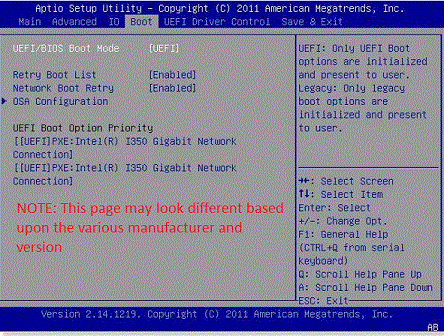
NOTE: Have patience when activating this shortcut. There can be up to a 30 second delay for this action. This is NORMAL.
NOTE: If your UEFI settings have been disabled and set to (Legacy) BIOS on your UEFI capable PC, enabling UEFI settings on your computer will make this shortcut available to you.
Hope this helps save some of you like it did for me from the ever persistent finger mashing, and the often confusing and forgetful question: "what key do I press?" during start-up.
